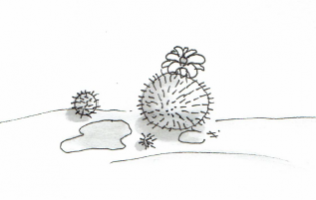Difference between revisions of "Needle Plant"
From World of Entorais Wiki
Jump to navigationJump to searchm (picture tags) |
(layout) |
||
| Line 1: | Line 1: | ||
[[File:Needle_plant.png|thumb|right|x200px|''Needle Plant'' - Sebastian Romu © 2018]] | [[File:Needle_plant.png|thumb|right|x200px|''Needle Plant'' - Sebastian Romu © 2018]] | ||
=Description= | |||
;Common Names:Needle Plant | ;Common Names:Needle Plant | ||
;Classification:Succulent, Cactus, Flower | ;Classification:Succulent, Cactus, Flower | ||
A low ball-shaped cactus with large pink flowers. The needles are hollow and contain a mild anaesthetic, and muscle relaxant. The pulp of the main body can be distilled to make an excellent restorative tonic. | :A low ball-shaped cactus with large pink flowers. The needles are hollow and contain a mild anaesthetic, and muscle relaxant. The pulp of the main body can be distilled to make an excellent restorative tonic. | ||
=Ecology= | |||
;Rarity:common | ;Rarity:common | ||
;Distribution:Tropical to temperate deserts, scrub lands and less commonly plains | ;Distribution:Tropical to temperate deserts, scrub lands and less commonly plains | ||
;Life Cycle:Flowers every two or three years, producing a small red berries. Seed distribution by animals which eat the fruits. | ;Life Cycle:Flowers every two or three years, producing a small red berries. Seed distribution by animals which eat the fruits. | ||
=Uses= | |||
;Cultivation:none | ;Cultivation:none | ||
;Culinary:none | ;Culinary:none | ||
| Line 16: | Line 16: | ||
;Other:<!-- other uses--> | ;Other:<!-- other uses--> | ||
=Culture= | |||
<!-- unique cultural notes--> | <!-- unique cultural notes--> | ||
==See Also | =Stories= | ||
=See Also= | |||
[[Category:Flora]] | [[Category:Flora]] | ||
Revision as of 19:54, 25 December 2019
Description
- Common Names
- Needle Plant
- Classification
- Succulent, Cactus, Flower
- A low ball-shaped cactus with large pink flowers. The needles are hollow and contain a mild anaesthetic, and muscle relaxant. The pulp of the main body can be distilled to make an excellent restorative tonic.
Ecology
- Rarity
- common
- Distribution
- Tropical to temperate deserts, scrub lands and less commonly plains
- Life Cycle
- Flowers every two or three years, producing a small red berries. Seed distribution by animals which eat the fruits.
Uses
- Cultivation
- none
- Culinary
- none
- Medicinal
- anaesthetic (needles), relaxant (needles), restorative tonic (pulp)
- Other
